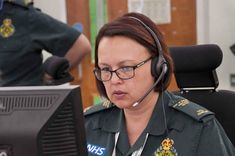999

How to call 999
In a medical emergency you should stay calm and dial 999 or 112.
You will need:
- the address where you are, including the postcode if you know it
- the phone number you are calling from
- to describe what has happened.
You will also be asked to give some extra information (if you know it) such as the patients age, sex and medical history, if the patient is conscious, breathing, if there is any bleeding or chest pain or a description of the injury and how it happened.
If it is appropriate, an ambulance response will be dispatched immediately, but you will be asked to stay on the phone so that the call handler can give you medical advice on how best to help the patient.
Answering these questions will not cause any delay in sending the most appropriate response to you but will help us to give you important first aid advice.
How to help us
There are a number of ways you can help us before we arrive:
- If you are in the street, stay with the patient until the ambulance or rapid response vehicle arrives. Call back if their condition or location changes
- If you are calling from home or work, get someone to open the doors and signal where the response is required
- Lock away any family pets
- If you can, write down the patient's GP's details and collect any medication they may need
- Remember to stay calm - ambulance crews are there to help and violence towards them will not be tolerated.
There are also a number of things you can do to help ambulance responders in your area:
- Check that you house number or name is clearly visible from the roadside.
- Be prepared and only dial 999 when you really need to.
A traditional ambulance may not be the first vehicle to arrive on scene. It could be:
- a community first responder
- a single crewed response vehicle with an emergency care practitioner, paramedic or emergency medical technician
- the air ambulance
- an emergency doctor.
If you believe you need to go to hospital, can you get there by car, public transport or taxi? You will not be seen any quicker at the hospital if you arrive by ambulance.
If you dial 999 for a problem which is not a genuine emergency, then you could be delaying our response to someone who is suffering from a life-threatening condition.
Remember, it's your call so make the right one!
If you have difficulty making voice calls due to a hearing or speech impairment, you can contact us by a text message from your mobile phone. You must register your mobile in advance to use this service. Emergency-SMS is available in any type of emergency and is only for people who cant use the standard 999 voice services.
Want to give feedback?
If you have recently contacted our 999 emergency service, we are keen to receive your feedback about the quality of service you received from us to ensure that we meet the needs and expectations of our patients.
